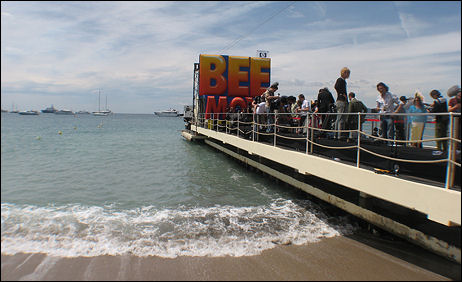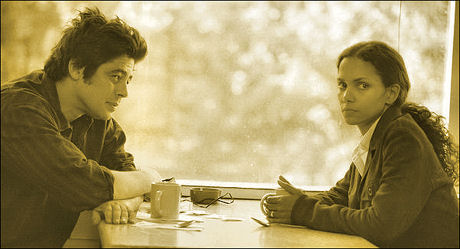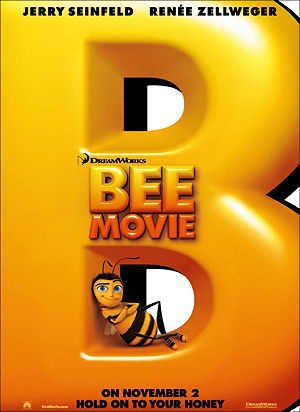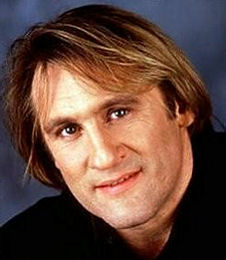“After watching Evan Almighty, I noticed that the exiting audience — pale, wan and harrowed — were collectively singing the post-movie equivalent of the lamentations of Jeremiah, emitting cries not unlike those of the sorely tested Job or the benighted citizens of plague-fatigued Egypt, and generally cursing His Holy Name with every obscenity in the biblical lexicon.
“All the Big Questions popped rapidly into my mind: ‘Why does God inflict Bad Movies on Good People?’ and more pertinently, ‘How can we know for certain that God is good if he permitted this piece of dung to reach our screens?’
“Certainly Evan Almighty (‘a laugh-drought of biblical proportions,’ one critic called it) performed a breathtaking miracle by making Steve Carell unfunny, but the film should have believers and nonbelievers alike down on their knees praying for funnier comedies.” — thus sayeth (or said-ith) The Guardian‘s John Patterson.
Norton’s not a tribe member
Edward Norton participated in a Hulk dog-and-pony show in front of 6500 Comic-Conners yesterday along with costar Liv Tyler, Hulk director Louis Leterrier, and producers Avi Arad and Gale Anne Hurd. It had to have felt a little forced. Norton simply isn’t part of the tribe — doesn’t talk geek, look geek….the genes and the attendant belief systems simply weren’t passed along by his parents — and no amount of good-sport promo whoring can change that fact. (Original reporting by MTV.com’s Larry Carroll.)
Walken cooks a chicken with pears
“And heah, out of the oven…the chicken and the peahs….very nice…sort of a French thing….a little pepper on the top….400 degrees…one hour….these peahs are very nice, very tasty…they’ve gotten kinda candied …pehrfect with the chicken…they go very well togetheah.” — Christopher Walken cooking what looks like a delicious upright chicken along with six or eight sweetened pears. Walken’s a serious foodie, but it’s hard to watch this video without wondering when the punchline’s coming, even though you realize there probably won’t be one. And you’d be right.
Superbad “Hornet” Rogen
We’ve all chewed on the notion of Seth Rogen, Evan Goldberg and maybe Neal Moritz co-writing a Green Hornet movie in which Rogen will play the title role as well as his alter ego, the “debonair newspaper publisher” Britt Reid. But what can be made of this report from Coming Soon’s Edward Douglas about a Comic-Con Superbad q & a in which Rogen “stated very clearly that the movie is ‘not a comedy, it’s an action movie.'”

Is there anyone in the world who believes Rogen & Co. won’t be tweaking the material for at least some laughs? Playing it straight doesn’t seem to be Rogen’s repertoire, or am I missing something? And who, for that matter, is going to buy him as any kind of butt-kicker? With that beer, nachos and chili-dog physique of his?
“Bee Movie” poster
I watched the Bee Movie footage at the Cannes Film Festival, I listened to Jerry Seinfeld do a funny riff about it, and it all seemed fine. I said on the day of the Cannes thing that “I’m half into it…I like ‘silly’ if the movie really goes for it whole-hog.” But this one-sheet is just…what is it? It’s dull and smug like cereal-box art. It seems afraid to say or do anything that might define the movie in some specific attitudinal way, and thereby persuade some of us to actually sit up and take notice.
I recounted the Bee plot last May: “Barry B. Benson (Seinfeld) is a bee who’s not thrilled at the idea of doing just making honey for the rest of his life. A disillusioned insect who wants to be different…the same idea Woody Allen had in Antz.
“Barry gets to leave the hive on a honeysuckle mission in Manhattan’s Central Park, and he eventually runs into humans who try to swat him to death. Barry is saved by Vanessa (Renee Zellweger), a kind-hearted hottie, and he promptly falls in love. Kind of a King Kong-Ann Darrow romance in reverse.
“Then he decides to talk to her. English, that is. Then he learns about the human honey business, and decides that humans are ripping off the bees in order to do so, and so files a lawsuit to try and prevent this.”
Bee Movie comes out on 11.2. Chris Rock, Matthew Broderick, Oprah Winfrey, Sting and Ray Liotta (among many others) voice the other bees and humans who figure in the plot.

Geekboy regimentation
A hundred years hence, film historians will look back at the epic-quest CG fantasy fanboy-adventure genre (Arthurian comic-book fables, other-worldly milieus, mind-blowing visuals, Joseph Campbell-esque heroes in their 20s, constant insinuations and threats from all-powerful reptilian villians, relentless physical combat or sword-fight scenes, gah-gah finales) and be absolutely agog that tens of millions went to these films over and over again for decades (geek culture has sprayed shorts over these films since Star Wars opened 30 years ago) without making a peep about how oppressively similar they were from year to year, decade to decade.
The historians will conclude with mixtures of amazement and mystification that the fanboys wanted the same myth over and over, and that Hollywood kept obliging over and over, and that the cycle kept on ad infinitum. And nobody ever said “hey, what is this?” except for the occasional online iconoclast, and whenever one of these soreheads spoke up he/she would get trashed and shouted down and called stupid and irrelevant.
That said, the Angelina Jolie nudie-temptress footage in the Beowulf trailer is greatly appreciated.
Jabba at Comic-Con
There’s a funny caption that needs to go with this photo, which accompanies Michael Cieply‘s readable but slightly ho-hum Comic-Con story in the 7.27 N.Y. Times. Who would’ve thought when Jabba the Hut first appeared in Return of the Jedi 24 years ago that he would gradually become an icon of…naahh, not today.

“Fire” trailer
The high-def trailer for Susanne Bier‘s Things We Lost in the Fire (Dreamamount, 10.26). It’s a working-through-tragedy story about the best friend of a dead guy — a dad who had a wife and two or three kids — slowly edging into intimacy of one form or another (perhaps not sexual) with his widow. One viewing and you can tell that Benicio del Toro (i.e., the best friend) is giving one of his most appealing performances — his most accessible since Traffic. Halle Berry is the widow; David Duchovny is the deceased ex.

Five “Blade Runner” versions
Come 12.18 you’ll have the option of paying between $55 and $70 dollars for the Blade Runner Five-Disc Ultimate Collectors’ Edition DVD set from Warner Home Video, and you’ll get no less than five versions of Ridley Scott‘s 1982 sci-fi noir. There’s something insane about a package like this. You don’t have to be a Blade Runner obsessive living in your parents’ basement to want to own one, but it would help.

The thing for us level-headed types to do, of course, is buy or rent a stand-alone of Scott’s all-new, restored and remastered “final cut” with added and extended scenes, added lines, new and cleaner special effects and all new 5.1 Dolby Digital Audio track…and forget the rest.
The five-movie set includes (a) Scott’s latest cut (what’s he going to do — improve it again in three or four years?), (b) the 1982 Ladd Co. cut — the truncated theatrical version with that awful Harrison Ford/Deckard narration and has a “happy ending” getaway scene, (c) the “international ” seen on U.S. home video, laser disc and cable releases up to 1992, (d) the 1992 Director’s Cut version sans narration, no “happy ending” finale plus the “unicorn” sequence that suggests Deckard may be a replicant, and (e) something called a “work print” version (altered opening scene, no Deckard narration until the the end, no “unicorn” sequence, no “happy ending,” etc.). Plus a documentary called “Dangerous Days: Making of Blade Runner.”
Women prosecuting women
Bidisha, a British author and art critic, is claiming in a Guardian piece that it’s the gossip publications and not the whacked-out celebs who are the true orchestrators of pain and meltdown and ruination. And not so much the publications as the women who work for them.



“The media that deal in pop freakouts don’t report these stories so much as create them,” she says. “If Britney Spears has had any kind of meltdown, who can blame her? She is followed wherever she goes by stalker-violators: some have cameras and call themselves paparazzi; some have notebooks and call themselves journalists; some have vaginas and call themselves concerned women of the world. All relish the harassment that they perpetrate.
“It is women (writers and readers) who are enjoying and encouraging the exposure of Lohan’s drink and drugs hell or Spears’s identity crisis, while saving space for a snide comment about their outfits. It is women who are getting off on other women’s difficulties, while men in power carouse, abuse (and self-abuse) with impunity.
“Who are the real ‘bad girls’? Not Lohan or Spears. The gossip magazines may be as punchy as a dose of Splenda, but they offer evidence that women have obediently taken on the values of a woman-hating world. We must recognise the part women play in the degradation of women: the ultimate betrayal.”
Headless Lady
I’m slow from time to time, but I hadn’t seen the headless Statue of Liberty art for J.J. Abrams‘ monster film (i.e., the one that absolutely cannot be called Monstrous) until last night. Was it revealed at some earlier point?






